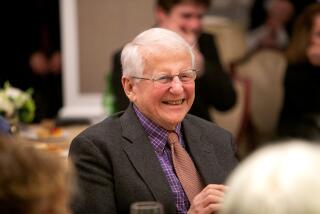TV Reviews : A Guide to Berkoff and Kafka on Bravo
- Share via
Anyone who has been stumped by the work of Steven Berkoff--its bombast, its outrageousness, its virulence, its scatology--might find the Sunday 3 p.m. edition of “The South Bank Show” on Bravo cable (repeated May 29 at 7 p.m. and 12:30 a.m.) a guide to understanding this extreme iconoclast.
“His philosophy, his way of life and his art are exactly the same,” says Joseph Papp, artistic director of the New York Shakespeare Festival, who employed Berkoff to stage “Coriolanus,” finding him something of an enigmatic handful.
“He is what he does.”
That is perhaps the key to this rebellious child of Russian Jews (his father was a tailor), who grew up in the rough and tumble area of East London and proceeded to conduct his life with a logic at once enviable in its directness and trouncing in its bluntness.
The show intercuts among Berkoff acting, Berkoff talking about himself and others talking about Berkoff--such as Papp, Roman Polanski (who played Gregor Samsa in Berkoff’s stage adaptation of Kafka’s “Metamorphosis” in Paris in 1988), Mikhail Baryshnikov (who took on the same role on Broadway) and actress Linda Marlowe, his partner in “Decadence” and “Greek.” The variety of commentary deepens the portrait.
Since the show is followed (at 7 p.m. and 1:30 a.m., and again May 29 at 8 p.m. and 1:30 a.m.) by Berkoff’s own impressive, highly stylized television version of “Metamorphosis” (starring Tim Roth as an electrifying “bug” and Berkoff as the father), these segments take on special significance.
“It was through my loneliness that I identified with Gregor Samsa,” says Berkoff, explaining the physical attempt to create movement on “six legs” by crossing the arms, raising the wrists, bending the elbows, spreading the knees, dragging the legs.
“His ideas are very, very strong and he gets what he wants,” comments Polanski. “It’s difficult on the actors, but so what?” Adds Baryshnikov: “He never allows you to think during rehearsal.”
“I started writing because I wasn’t employed,” Berkoff says about his beginnings. “They didn’t recognize this gigantic neo-Olivier,” which in part explains why he wrote such plays as “East” and “Greek” in a unique, neo-Shakespearean slang--and why critics have accused him of “intellectual incontinence” and writing like a 15-year-old who looks 50.
Berkoff’s lifelong “anti-authority stance” also explains why the explosive quotient of “adolescent rage” in his plays makes them such good therapy for prison inmates. Berkoff mimes everything, from props to violence. “Language,” he says, “should represent the violence . . .,” and despite the misogyny that pervades many of his 10 or so plays, he is the author of some of the most explicitly ardent writing for and about women.
As an adjunct to “The South Bank Show” and “Metamorphosis,” a segment of “The Modern World: Ten Great Writers” focusing on Kafka (and featuring a presentation of “The Trial”) airs Sunday at 4 p.m. (and May 29 at 9:30 p.m.). Each can be seen independently, of course, but the three together constitute a mini-education in modern theater.
More to Read
The complete guide to home viewing
Get Screen Gab for everything about the TV shows and streaming movies everyone’s talking about.
You may occasionally receive promotional content from the Los Angeles Times.






